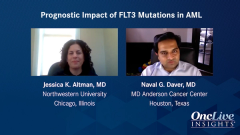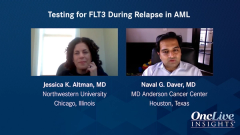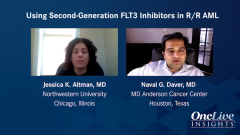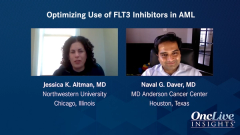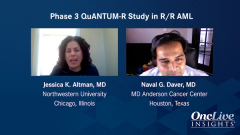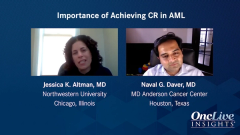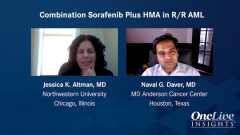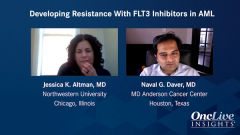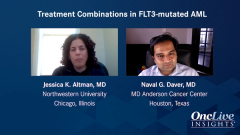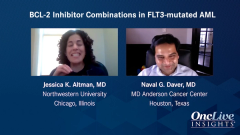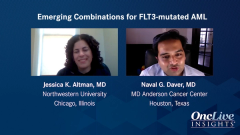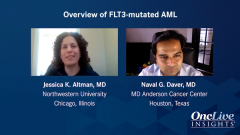
Using Second-Generation FLT3 Inhibitors in R/R AML
Jessica K. Altman, MD, reviews the safety and efficacy of gilteritinib as seen in the ADMIRAL trial for the treatment of relapsed/refractory acute myeloid leukemia.
Episodes in this series

Naval G. Daver, MD: We can discuss some of the drugs. You worked very closely on the gilteritinib development in the ADMIRAL trial. Could you give us a brief overview of the trial and results, and tell us where you’re using gilteritinib in practice?
Jessica K. Altman, MD: Absolutely. Gilteritinib is an oral FLT3/AXL inhibitor, but as we think about it clinically, it is a FLT3 inhibitor. It is approved for the treatment of relapsed and refractory FLT3-mutated AML [acute myeloid leukemia].
The trial that led to the approval of gilteritinib was called the ADMIRAL study, which you mentioned previously. About 250 patients were randomized 2:1 to receive gilteritinib versus salvage chemotherapy. The salvage chemotherapy was chosen prior to randomization, which we have seen in other trials as well. There were 2 intensive options, MEC [mitoxantrone, etoposide, cytarabine] and FLAG-IDA [fludarabine, cytarabine, G-CSF, idarubicin], and 2 less-intensive options. Ahead of time, the investigator assigned what they would have randomized the patient to if they received standard of care. And then the patients were randomized 2:1 to receive gilteritinib versus salvage chemotherapy.
The gilteritinib arm resulted in improvement in overall survival [OS]. I think the OS was about 9 months compared to 5 months. Patients were able to go on to stem cell transplant. Patients who were on the gilteritinib arm, I believe they were able to receive gilteritinib after transplant as well.
The adverse events seen with gilteritinib were fairly minimal. It’s a pretty well-tolerated agent. We sometimes see a little bit of nausea. Neutropenia and neutropenic fever can occur. Thrombocytopenia occurred in about a third of patients or so.
Naval G. Daver, MD: Basically, this is a major breakthrough. When we talk about AML—of course we will discuss venetoclax and BCL2 as a major breakthrough—I think the targeted therapies, FLT3, IDH, are probably very close in their impact. We discuss it, but conceptually you will never see a trial like this in solid tumors. We took a single oral agent outpatient therapy and compared it to high-dose, 3-drug IV [intravenous] chemotherapy. I think 80% of the patients went on FLAG-IDA [fludarabine, cytarabine, G-CSF, idarubicin] or MEC [mitoxantrone, etoposide, cytarabine], and we were not seeing that they’re equal. If I were a patient, I would say even if this oral outpatient, well-tolerated therapy is equal to the 3-drug IV chemotherapy option, this is good enough for me. But no, it was superior in every aspect we looked at. Sometimes I feel like the bar is that much higher in AML, regarding drug approvals. I’m glad that we met that bar here. This shows 2 things. One is that chemotherapy in relapsed AML, especially FLT3 AML, is really bad. For many years, many people argued, “I can get 40%, 50% response rates.” But if you look at both the ADMIRAL and QuANTUM-R studies, which had very similar designs and were done in parallel, you see 20% to 25% CRs [complete responses]. So really, I see no patient for whom I would give chemotherapy alone.
Now, it’s different if you combine chemotherapy with gilteritinib, quizartinib. Also, if we see the glass half empty and when you look at 2 years, the survival is only 15%. Even though gilteritinib was so powerful, it’s not enough, right?
Transcript Edited for Clarity


